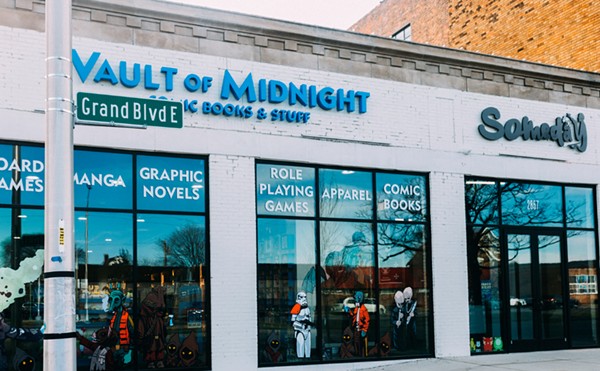I first became aware of the art form known as urban toys last year in New York City, when an artist friend left a bizarre message on my answering machine. “Veence,” the voice with a thick Russian accent exclaimed, “Call me right avay! Dey are stealink my soul on Grand Street.”
It turned out that, on the border between Chinatown and SoHo, a shop specializing in street-culture music, clothing and reading material was showing a collection of handcrafted action figures by a Japanese artist. One of them was a buxom female about 8” tall with shaggy blond hair, dressed in silver breastplate and a short red skirt, its jack-booted right foot raised in the process of delivering a karate kick. Other than the character’s name, Irina, I failed to see the resemblance.
Irina is a bit of a wack job, but her suspicions aren’t totally off the wall. The emerging toy market has a style fetish, turning identity into a commodity with designs that imbue each little character with a unique personality.
Urban toys are part of a new international underground that has emerged in the face of global capitalism unbound. The genre is a mashup of hip hop and Asian cultures, pop futurism and kitsch retro. It’s another form of street art that plays as well in New York City, London and Los Angeles as it does in Tokyo and Shanghai.
The earliest examples are believed to be the street-culture action figures of Hong Kong’s Michael Lau, who in the ’90s began creating handcrafted dolls inspired by B-grade kung-fu movies and Western creative forms like American gangsta rap. They’re edgier variations on anime, manga and kawaii-mono, “cute things” like Hello Kitty, serving as source material for sculptures and paintings by contemporary Japanese artists Takashi Murakami and Yoshimoto Nara.
One of the leaders of the urban toy scene, Tristan Eaton, curates Vinyl Klash 2 at CPop Gallery, opening on Saturday, April 2, with a paintball performance event.
Eaton is the creator of Dunny, a rabbit-eared featureless miniature trading figure cast in smooth soft white vinyl. In its unadulterated state, each Dunny is a blank canvas meant to be custom-painted by other artists; variations on Dunny are the basis of Vinyl Klash.
The 26-year-old Eaton, who spent his high school years in Detroit and who now lives in Brooklyn, organized the first Vinyl Klash exhibit last year at a SoHo art gallery. Magical realist painter Alexis Rockman and fashion-maven Diane von Furstenberg were among those who put their signature interpretations to Dunny, along with a host of graffiti writers and street artists from around the world. (Famed postmodern artist Richard Prince reportedly paid more than $8,000 to acquire a piece from the show for his personal collection.)
The Detroit edition of Vinyl Klash, showing two- and three-dimensional works, features art by CPop regulars — culture jammer and billboard artist Ron English, illustrator-artists Glenn Barr, Mark Dancey and Tom Thewes, and neo-medievalist Renata Palubinskas, as well as artists from the first exhibition.
Urban toys can be either one-of-a-kind or handmade in limited editions.
An obvious precedent for Vinyl Klash is Andy Warhol, whose exhibitions often featured a unifying element (flowers, Chairman Mao, the Last Supper, etc.) presented in different sizes and stylistic renderings. There are also the old Willis Gallery box shows, where local artists would respond to a manufactured item with their interpretations.
The new generation of toy designers is crashing the art world’s exclusive party and reversing its conventions. Where postmodernists like Jeff Koons debase high art with vacuum cleaners, porcelain tchotchkes and porno, these designers ask us to look at their ephemeral creations as pure aesthetic forms.
The works in Vinyl Klash are unique; however, some could end up being knocked off in a Chinese sweatshop for the broader collectors’ market. Irina was perhaps paranoid in thinking her inner being had been stolen, but like so many other kinds of “hip” consumerism, urban toys may in fact be a way of assimilating into the global order while letting us buy into the idea that we’re resisting it.
Vinyl Klash 2, curated by Tristan Eaton, runs April 2-May 13 at CPop (4160 Woodward Ave., Detroit; 313-833-9901). Opening reception features live paintball firing range, 6-10 p.m. Saturday, April 2. Vince Carducci writes about art for Metro Times. Send comments to [email protected]





